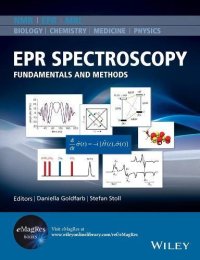
Ebook: EPR Spectroscopy: Fundamentals and Methods
Author: Daniella Goldfarb Stefan Stoll
- Tags: Analytic, Chemistry, Science & Math, Physics, Acoustics & Sound, Applied, Astrophysics, Biophysics, Chaos Theory, Chemical Physics, Cosmology, Dynamics, Electromagnetism, Electron Microscopy, Energy, Engineering, Entropy, Gas Mechanics, Geophysics, Gravity, Light, Mathematical Physics, Mechanics, Microscopy, Molecular Physics, Nanostructures, Nuclear Physics, Optics, Quantum Chemistry, Quantum Theory, Relativity, Solid-State Physics, System Theory, Time, Waves & Wave Mechanics, Science & Math, Chemistry, Science & Mathematics, New
- Series: eMagRes Books
- Year: 2018
- Publisher: Wiley
- Edition: 1
- Language: English
- pdf
This unique, self-contained resource is the first volume on electron paramagnetic resonance (EPR) spectroscopy in the eMagRes Handbook series. The 27 chapters cover the theoretical principles, the common experimental techniques, and many important application areas of modern EPR spectroscopy. EPR Spectroscopy: Fundamentals and Methods is presented in four major parts: A: Fundamental Theory, B: Basic Techniques and Instrumentation, C: High-Resolution Pulse Techniques, and D: Special Techniques.
The first part of the book gives the reader an introduction to basic continuous-wave (CW) EPR and an overview of the different magnetic interactions that can be determined by EPR spectroscopy, their associated theoretical description, and their information content. The second provides the basics of the various EPR techniques, including pulse EPR, and EPR imaging, along with the associated instrumentation. Parts C and D builds on parts A and B and offer introductory accounts of a wide range of modern advanced EPR techniques, with examples of applications. The last two parts presents most of the new advances that do not appear in most of the classical EPR textbooks that focus on CW EPR.
EPR Spectroscopy: Fundamentals and Methods contains, in concise form, all the material needed to understand state-of-the-art EPR spectroscopy at the graduate school/research level, whilst the editors have ensured that it presents the topic at a level accessible to newcomers to the field and others who want to know its range of application and how to apply it.